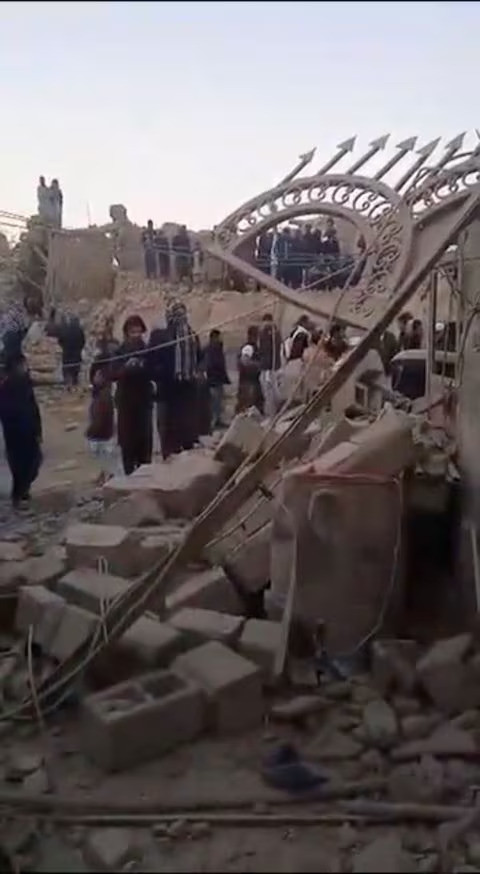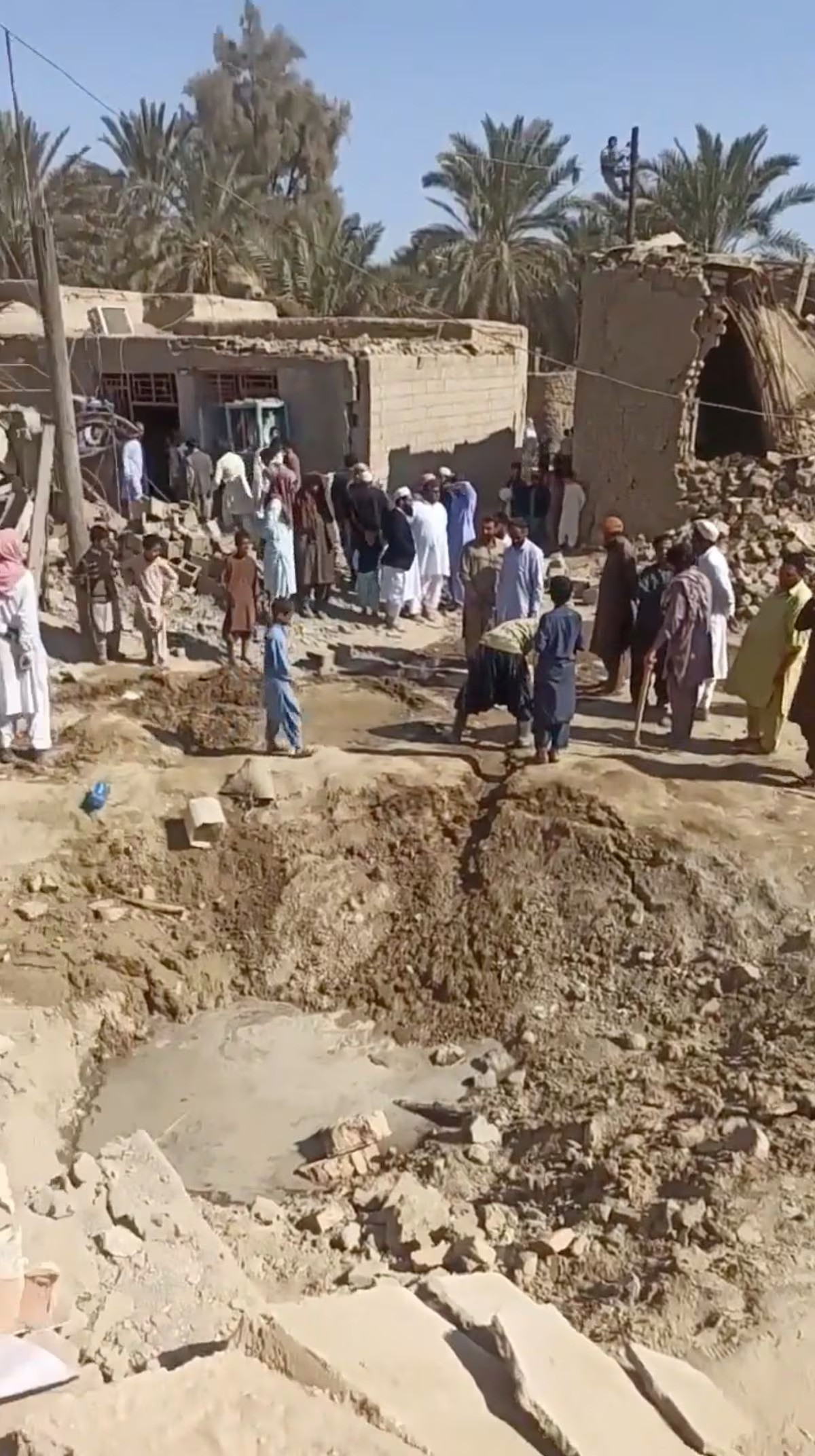A reckless and irrational military misadventure from Iran’s Islamic Revolutionary Guard Corps (IRGC) in Pakistan triggered a brief military standoff and diplomatic breakdown between two friendly neighbours last week. The IRGC’s unprecedented drones and missiles strike in the remote Panjgur district of Balochistan took everyone by surprise because it happened in the midst of a flurry of cordial bilateral diplomatic and political engagements. The IRGC rationale for the provocation remains murky. Military strategists and defence analysts are scratching their heads about Iran’s motivation for heating up its border with a friendly neighbour at a time when its arch-enemy Israel is escalating its genocidal military campaign in Gaza into a wider Middle East conflict with the potential to draw in the Islamic Republic? What objectives did the IRGC want to achieve from this miscalculated gamble, imperiling relations with Pakistan? Let’s try to figure out.
Domestic compulsions
Iran’s theocratic regime has been under domestic pressure following back-to-back terrorist attacks. On Dec 15, 2023, gunmen killed 11 security personnel in a deadly rampage at a police station in the Rask area of Sistan-Baluchestan province. Sunni separatist group Jaish al-Adl claimed responsibility for the brazen assault, which took place nearly 50 kilometres away from the border with Pakistan’s Balochistan province. Ten days later, IRGC senior adviser Brigadier General Sayyed Razi Mousavi was killed in an air raid in Damascus, Syria. And more than a week after Mousavi’s killing, twin bombing devastated a memorial for General Qassim Suleimani, the most revered commander of IRGC’s Al-Quds Force who was killed in a US drone strike in Iraq in 2020. The Islamic State in Iraq and Syria (ISIS) purportedly claimed credit for the bombing at Suleimani’s shrine in Kerman province that killed nearly 100 mourners. These mass causality and high-profile attacks rattled Tehran and ratcheted up pressure on the Iranian security forces, particularly the IRGC, to take revenge.

‘State within state’
Why on the IRGC in particular? The architect of theocratic Iran, Ruhollah Khomeini, raised the Revolutionary Guards Corps in 1979 to defend the “revolution” from both internal and external threats through its Basij militia and Al-Quds Force, respectively. Today, the IRGC has “outsized its role and outstretched its purpose” as it dictates the nation’s politics, foreign policy, and even sets its economic direction. Simply put, the IRGC has effectively become a “state within the state”.
The Revolutionary Guards were compelled to do something to justify their oversized role. They carried out long-range ballistic missiles strikes against what they called “one of the main headquarters of Israel’s spying agency Mossad” in Iraq and ISIS targets in Syria on Jan 15. A day later, the IRGC launched a surprising air assault involving missiles and kamikaze drones on purported havens of Jaish al-Adl in a small village nestled in the mountains of Panjgur. The Iraq and Syria strikes were not only a reprisal for the Kerman bombings but were also meant to deter Israel and the United States through power projection. Moreover, these strikes were a demonstration of Iran’s military prowess to its regional proxies – Houthis in Yemen, Hezbollah in Lebanon, Palestinian Islamic Jihad in Gaza, and militias in Syria and Iraq.
Dangerous gamble
The Syria and Iraq strikes were a calculated risk because the IRGC knew the two war-wrecked countries would not hit back. However, the infringement of territorial sovereignty of a nuclear-armed state defied logic. Pakistan is not a hostile country and Iran could have conveyed through existing multiple communication channels if it had any actionable intelligence on Jaish al-Adl’s presence in Balochistan. Iran should recall that the 2010 capture of Abdolmalek Regi, the enemy No. 1 of the Islamic Republic, wouldn’t have been possible without Pakistan’s help. Regi was the leader of Jundollah, the Baloch separatist terrorist group responsible for some of the deadliest attacks in Iran. The arrest and subsequent hanging of Regi in 2010 led to the virtual exit of Jundollah from the complex tapestry of regional militant landscape. Interestingly, Jaish al-Adl, which is actually a reincarnation of Jundollah, wants independence for Iran’s Sistan-Baluchistan and Pakistan’s Balochistan. It, therefore, is unrealistic to assume that Pakistan was harbouring Jaish al-Adl havens on its soil. No doubt the Sabz Koh area of Panjgur where the Iranians struck is the hometown of Mullah Hashim, the former No. 2 of Jaish al-Adl, but he is long dead.
Trigger-happy bravado out of domestic compulsions doesn’t suit responsible states. Pakistan is in possession of credible intelligence about the presence of Baloch separatist terrorist groups, especially Balochistan Liberation Front (BLF) and Balochistan Liberation Army (BLA), on Iran’s soil, and of the Tehreek-e-Taliban Pakistan (TTP) in Afghanistan’s territory. Islamabad has shared with Tehran and Kabul multiple dossiers with concrete evidence of use of their territories by these groups against Pakistan, but as a responsible state it has resisted the motivation to carry out a unilateral cross-border counterterror operation.
Did IRGC go solo?
The IRGC provocation was surprising also because a day earlier a high-level Iranian delegation, led by the country’s special envoy on Afghanistan, Hassan Kazmi Qomi, had had extensive talks with top foreign ministry officials in Islamabad. Moreover, Governor Sindh Kamran Tissori was leading a businessmen’s delegation to an export exhibition in the Iranian city of Mashhad. Also, Balochistan’s Chief Collector Customs, along with members of the provincial chambers of commerce and industry, and senior security and government officers, was also in Chabahar for a Joint Border Commission meeting. More surprising is the fact that hours before the incursion, Iranian Foreign Minister Hossein Amir-Abdollahian had had a cordial meeting with Pakistan’s Caretaker Prime Minister Anwaarul Haq Kakar on the sidelines of World Economic Forum in Davos.
This begs the question: did the IRGC act unilaterally without the government’s prior node of approval? Seems like a plausible explanation given the IRGC’s “state within the state” status. This also makes sense because the Iranian regime quickly climbed down the escalation ladder after the Pakistan military exacted revenge with precision strikes against the BLA and BLF targets in the Saravan area of Sistan-Baluchestan within 48 hours of the IRGC incursion. Tehran denounced the “unbalanced and unacceptable” retaliation, but confirmed that those killed were not Iranians, giving credence to Pakistan’s claim that Baloch terrorists were the target. Pakistan’s military codenamed its retaliatory operation “Marg Bar Sarmachar” (Death to Terrorists). By strange coincidence “Marg Bar America” was the war-cry of the IRGC during the early days of the Islamic revolution in Iran.

Better sense prevails
The IRGC surely knew its provocative raid won’t go unpunished. If it did not, then it was naïve to assume Pakistan with a much stronger military than Iran’s would take the infringement of its sovereignty lying down. Pakistan took on a five times bigger enemy when India violated its airspace to carry out a “farcical air strike” in the Balakot region of Khyber-Pakhtunkhwa in February 2019. Pakistani military delivered “Swift Retort”, hitting military targets deep inside Indian Occupied Kashmir and then exacting further humiliation on Delhi by downing its fighter jet chasing Pakistani warplanes. Pakistan could not allow Iran to set a dangerous precedent for India, which was quick to justify the Iranian strike saying it “understands actions that countries take in their self-defence.” Pakistan cut off diplomatic ties with Iran before military retaliation. And after evening the score, the foreign ministry struck a conciliatory tone knowing well that Pakistan, which is already sandwiched between two hostile neighbours, could ill-afford a three-front dilemma with further escalation. “Going forward, dialogue and cooperation is deemed prudent in resolving bilateral issues between the two neighbouring brotherly countries,” the foreign ministry said in a statement after confirming the retaliatory military action in Iran.
In the end, better sense prevailed as two sides were quick to calm tension. The de-escalation wouldn’t have been possible without the quick and subtle mediation from common friends. Pakistan’s National Security Committee, which was hurriedly convened to discuss the sudden escalation and military hostilities, downplayed it as a “minor irritant”. The foreign ministers of two countries also spoke by the phone and agreed to de-escalate the situation and restore fractured diplomatic ties. The two countries might have stepped back from the brink, but the unprecedented tit-for-tat escalation lays bare vulnerabilities in their relationship, underlining the need to strengthen cooperation and coordination against terrorism, which is a common security challenge for both.
